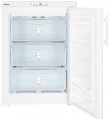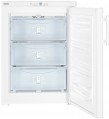Minimum temperature
The lowest temperature that the freezer can maintain in normal operation. First of all, the duration of food storage in the freezer depends on this parameter: it is believed that a temperature of -12 ° C is enough to preserve food for a month, -18 ° C – 3 months, -24 ° C – up to a year. At the same time, it must be taken into account that not only temperature affects the shelf life but also the type of product and its quality before freezing.
Power failure autonomy
The amount of time the freezer keeps food cold enough when the refrigeration system is turned off, for example, due to a breakdown or power outage. Technically, the power failure autonomy for each model is calculated differently; For example, for a freezer with an operating temperature of -18 ° C, this is the period during which the products in the chamber heat up from -18 ° C to -9 ° C. To sum up, the time is indicated during which the frozen products are guaranteed not to heat up to a temperature at which they could lose their properties.
Energy class
The energy class shows how economical the freezer is in terms of electricity consumption. Initially, the classes were designated in Latin letters from A (most economical) to G (high power consumption). Recently, improved classes A+, A++ and A+++ appeared (the more pluses - the more economical the device).
It should be borne in mind that this indicator represents not the actual energy consumption but the efficiency of the unit compared to similar models. Therefore, a small class A freezer may have a lower power consumption than a large class A++ model. And other things being equal, a more economical device, as a rule, costs more, but this difference can quickly pay off during the operation.
Energy class (new)
This parameter shows the efficiency of electricity consumption by the freezer. Classes are designated in Latin letters from A to G, in ascending order of energy consumption. It was originally conceived until more energy-efficient models pulled up to class A, which eventually received the marking A+, A++, and A+++. Further development of technology has made it possible to go even further and, in order not to produce pluses in energy efficiency labelling, in March 2021, manufacturers returned to the previous indices from G to A, where A is the most energy-efficient freezer. Accordingly, the 2021 models will have modern markings, while older models will be marked the old way.
Energy consumption per year
It is the average amount of energy consumed by the freezer in a year of operation. Of course, these figures are not absolutely accurate. The actual power consumption may vary depending on the specific operating conditions. However, this parameter makes it possible to evaluate the consumption of the device and compare different models with each other. At the same time, it often turns out to be more convenient and visual than the energy consumption class (see above) because, in this paragraph, we are talking about a specific figure (from which you can also calculate the cost of electricity consumed).
Noise level
The average noise level generated by the freezer during operation. The quietest models give out about 25 - 30 dB — this is the average noise background in a residential area at night (comparable to the ticking of a wall clock); the loudest — is about 60 dB (loud conversation). More detailed comparison tables can be found in special sources.
In any case, the lower the noise level, the more comfortable the use of the unit. However, it does not always make sense to look for the
quietest freezer: in some situations (for example, in a noisy workshop), the freezer's sound may be lost against the surrounding noise background. In addition, reduced noise often affects the price.
Noise class
This parameter allows one to decipher the noise level in decibels. It is marked, like other classes, in Latin letters, where A is the quietest class of wine cabinets.
Country of origin
It is the country in which, according to the manufacturer, this or that model is manufactured. Even though most of the capacities are concentrated in China, European factories for the production of household appliances have not disappeared. And some models can be produced there. In general, such a division into a Chinese or European factory should not particularly affect the quality of products, but the stereotype of a reliable European assembly is present. However, it is possible that the model may have a country of manufacture, for example, Poland, and in the store under the same article, you will meet China.

